In the tea fields of Kenya, the members of the Gatamaiyu community spend their days working hard to support their families. But all too often, tragedy strikes when parents, siblings, and friends are lost to unknown or untreated illnesses and injuries. Alumni Peter ‘98/G‘00 and Gail ‘98 Mbugua have returned to Peter’s hometown, building a transformative relationship between the Gatamaiyu and Cairn communities.
The Call: Mr. Benjamin & the Call to Kenya
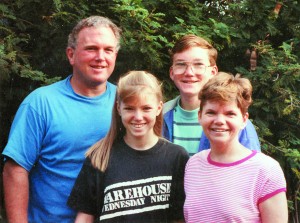 “It actually started at the Global Missions Conference here [at Cairn] in January 1989,” Blair Benjamin recounts, photo of his father, Kenneth Benjamin, in hand. “My dad was a music professor here since 1975, but one day, he decided to request a two-year sabbatical to teach in Kenya.”
“It actually started at the Global Missions Conference here [at Cairn] in January 1989,” Blair Benjamin recounts, photo of his father, Kenneth Benjamin, in hand. “My dad was a music professor here since 1975, but one day, he decided to request a two-year sabbatical to teach in Kenya.”
Approached by a representative from Africa Inland Mission (AIM), Mr. Benjamin was told about a ministry opportunity at Rift Valley Academy in Kijabe, Kenya, serving as a dorm parent and music teacher. That night, Blair remembers, “Dad came home and asked, ‘How would you like to move to Kenya?’”
Six months later, Mr. Benjamin, his wife, and Blair’s two younger siblings were on an airplane to Kenya.
The Fruit: Peter & School at Cairn
Mr. and Mrs. Benjamin lived at Rift Valley Academy for two years (1989-1991), both serving as dorm parents while Mr. Benjamin taught music. It was there at RVA that they met 21-year-old Peter Mbugua.
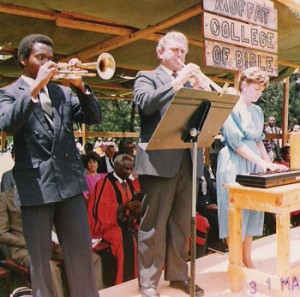 “The connection was right from the beginning,” says Peter. “They were very helpful in terms of helping me learn and understand music… but not only that, they were very interested in me personally. They provided friendship and connection that were very meaningful to me.”
“The connection was right from the beginning,” says Peter. “They were very helpful in terms of helping me learn and understand music… but not only that, they were very interested in me personally. They provided friendship and connection that were very meaningful to me.”
As it turned out, the Benjamins’ interest in Peter extended even beyond the borders of the African continent. After returning to the U.S., the Benjamins decided to sponsor Peter to continue to study music under Mr. Benjamin personally—at Cairn University.
“When I came to America, it was like a miracle through them,” Peter explains, “because there was no way I could have come to Cairn to study without their help. I didn’t ask them, but I think they saw the need—that I was very interested in music and learning in general—and they just wanted to provide me that opportunity.”
So on a cold January day in 1994, Peter arrived at Cairn University with just the clothes on his back and a little duffel bag. Soon, Peter came to view the Benjamins as his second family. “Even though I stayed at the dorms, I was free to go home to their house to stay and do whatever, to eat dinner, to go to church with them,” he explains.
Despite his previous closeness with Mr. and Mrs. Benjamin, Peter only fully recognized the extent of their generosity after living in the States. “When you are overseas,” Peter explained, “you think the Americans have a lot of money. I’d thought that they [the Benjamins] were doing this [sponsoring me] because they were rich. So when I came to America, I got a different picture, and I realized that they are among the least of those who would dare to think about helping someone come to study in a college.”
However, the Benjamins’ most valuable investment in Peter was personal discipleship. Mr. Benjamin, in particular, assumed a fatherly role in Peter’s life. Peter remembers, “Mr. Benjamin helped me put things into very simple terms—like looking at a problem, saying what the problem is, and saying what I can do about it.”
Although Mr. Benjamin died suddenly in September 2004, these lessons communicated through his mentorship continue to change lives across continents.
Going Back: Peter & Gail’s Journey to Serve Gatamaiyu
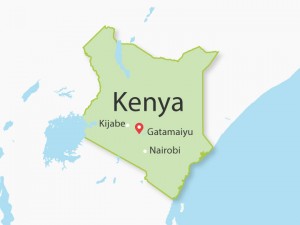 Although Peter married his wife, Gail, and settled down in the U.S., he could never shake the challenges facing his hometown of Gatamaiyu, Kenya. In 2002, two years after completing his Master’s in Christian Counseling at Cairn, Peter received notice from back home: His father had suddenly passed away.
Although Peter married his wife, Gail, and settled down in the U.S., he could never shake the challenges facing his hometown of Gatamaiyu, Kenya. In 2002, two years after completing his Master’s in Christian Counseling at Cairn, Peter received notice from back home: His father had suddenly passed away.
“It was just a basic fall,” Peter explains, “but within 24 hours, he died for reasons that no one seems to know.” Having lost his mother in 1991 to cancer, Peter had already experienced the grief of losing a family member who had been unable to obtain adequate medical care.
This pain is common in Gatamaiyu, a small farming community an hour north of the capital city of Nairobi. The nearest medical clinic is an hour’s drive away, and it requires patients to pay up front in cash. Although its economy depends on a single cash crop, tea, Gatamaiyu’s villagers are primarily subsistence farmers. This means that cash-in-hand is hard to come by.
For villagers without the means to own a car, hire a cab, or pay out of pocket, those medical resources are as out of reach as if they did not exist at all. “The old people, they need to travel so far away to get to the nearest place where they can get their medical needs met. And you see children who are suffering, but their parents don’t have enough resources to — not even to take them to the hospital, but to take them to the nearest facility where they could even get an idea of what their children need.”
“Every time we visited Kenya,” Peter explains, “we saw a lot of need. We would hear how people had passed away and no one seemed to know why they died.
“We felt like we needed to do something.”
The Simplicity of Response: The Beginnings of the Benjamin Wellness Center
During his time with Mr. Benjamin, Peter had learned how to identify a problem and address it using whatever resources he had. Although neither Peter nor Gail had a background in medicine, Peter knew what he could do: use his connections and resources in America to empower the people of Gatamaiyu.
For the next several years, Peter and Gail observed and networked with medical missionaries to Kenya, learning from their successes and mistakes. In 2006, Peter began to draw up plans with the church that he grew up in. Rather than building a stand-alone clinic, he has chosen to partner with A.I.C. Gatamaiyu in their vision for an education building. “We will rent the space for the clinic from the church,” Peter explained. “The facility is their facility, and when we pay rent, that money will support the work of the church.”
When establishing a 501(c)(3) for the purpose of raising American support for the project, Peter knew what he wanted to call the clinic: the Benjamin Wellness Center.
“Through their example, the Benjamins showed that it’s not resources or wealth that enable one to do great things or influence people. They helped me understand the simplicity of meeting the needs of others with what you have—not what you wish you had—and trust that God can meet people’s basic needs through someone simply willing to be available. They modeled for me that you don’t have to have a lot to respond to needs.
“So we started to respond to needs like they had responded to mine.”
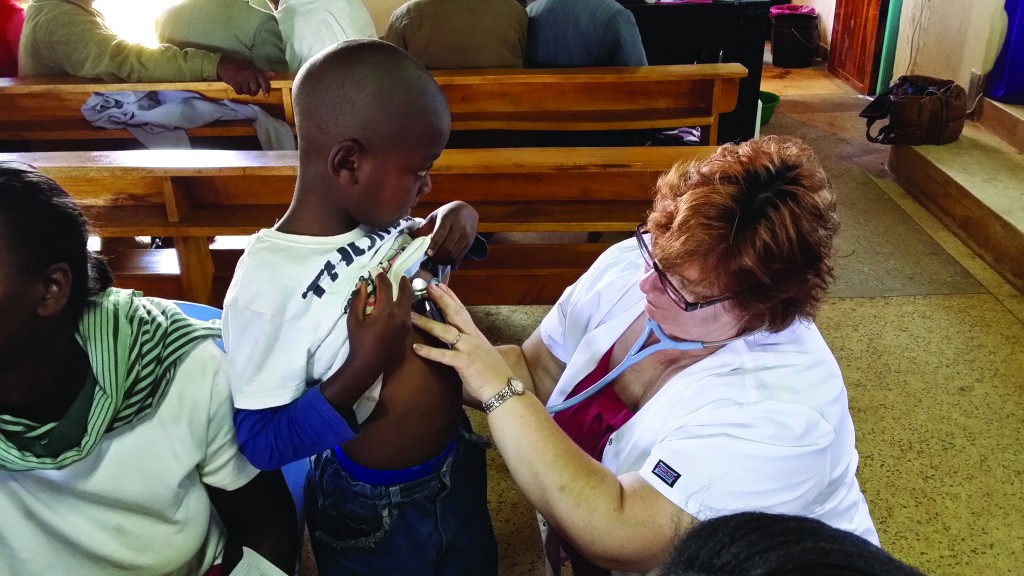
Helping Hands: Enlisting the Support of the Cairn Community
But as they tackled the task of opening a medical clinic, the Mbuguas could not do it alone. They started connecting with churches, raising funds for construction and operations. They sought partnerships with organizations that could assist with building expenses, as well as with obtaining medical supplies unavailable in the community, such as nebulizers.
They recruited teams of medical professionals to run two-week medical camps. In 2010, Cairn University pulled together its first trip addressing each of those needs. Led by Blair Benjamin, teams of 20 – 30 students, medical professionals, and alumni have visited Gatamaiyu four times in five years. Each year, they have hosted a medical camp serving up to 1600 people in eight days. In addition, they have worked alongside villagers in constructing the Wellness Center, led soccer clinics, visited orphanages, and presented on abstinence in schools and public health in the community. However, as Cairn students have discovered, it is the relationships being formed that have the biggest impact.
Presidential Intern Zach Mahon ’13 points out, “Obviously, you want to meet their physical needs—but the other side is relationship. Everything we do for them would mean nothing to them if we didn’t have a relationship with them.”
Peter explains further, “Something about the community, the culture there: If you just send the money, it won’t mean much. It would be like winning the lottery— there’s no connection. More than anything else that we do, people value the relationships between the groups. When you sit down with someone, listen to them, hear their story—that’s very important. People don’t care so much about what you give them; they care about how you are relating to them.”
[blockquote align=”left”]The relationship between the groups has changed dramatically… not only changing Kenyans’ assumptions about Americans’ expectations and work ethic, but also opening up opportunities for culture sharing and genuine engagement.[/blockquote]In just five years, Cairn’s returning teams have witnessed a transformation in their relationships with the Gatamaiyu community. “I see such a difference in the way [the villagers] let us get involved now, compared to 2010 when we first went,” says Natalie Crooke, who has participated in three of Cairn’s four trips to Gatamaiyu. “I remember when we first got there, they had this pile of the blocks that are being used to build the Center. They told us to move all these blocks into the center of where this building was going to be. They were heavy, but we did it in two days. Then, by the end of the week, they told us that they didn’t actually need them there, and we needed to move them all back out again. By that point, some of the guys had befriended one of our translators, who told them, ‘Oh. We didn’t expect you to actually work.’”
The relationship between the groups has transformed dramatically since then – not only changing Kenyans’ assumptions about Americans’ expectations and work ethic, but also opening up opportunities for culture sharing and genuine engagement. “That same year,” Natalie remembers, “the women were insistent: ‘You are the guests! We’re going to serve you.’ Now, they’ll come find me when they’re about to start cooking, which is so cool – and progressive of them, too.”
But relationships are not the only thing being transformed. Peter notes a wave of change among Gatamaiyu youth. “The community is small and isolated,” he explains, “and it’s hard for young people to have a vision of doing anything beyond what they have seen their parents and grandparents do. They are so busy just trying to survive that the idea of serving others or doing something besides basic farming isn’t in their thinking. In general, the people have thought that they don’t have anything they can do to address other people’s needs.”
However, since Cairn’s teams have started coming, the youth “have been surprised and challenged, especially by the Cairn students, as to how they can contribute and make a difference. Often, the young people have served as translators. They start to see what resources and abilities they have, to see what they can donate or contribute, even their time.”
“Some of them started to go to school,” Peter explains. “Now, some of them are getting jobs. We are starting to see that these are the people who will eventually contribute to making this clinic a success – and when there are needs that we are not able to provide for financially, these are the people that we will talk to, asking them to be donors to the clinic.”
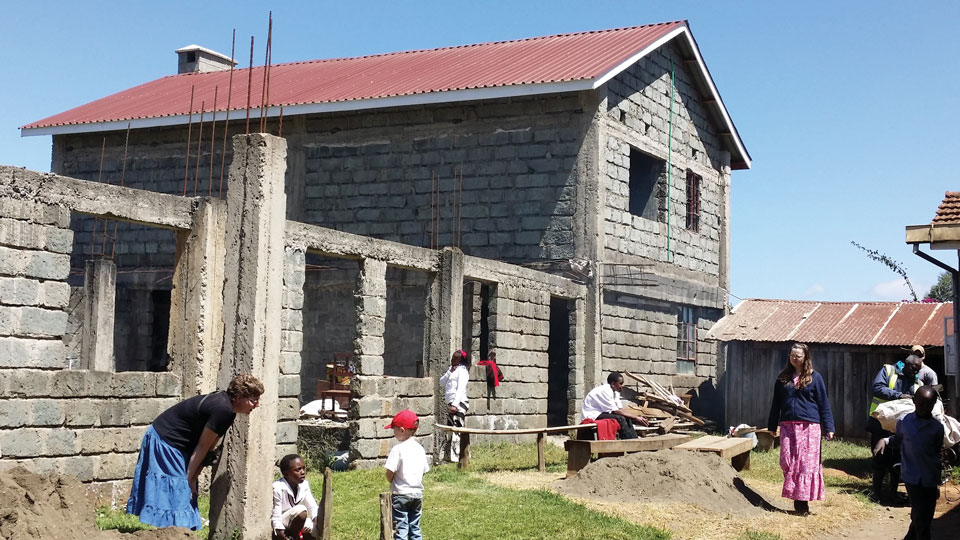
The Goal: Transformation for Gatamaiyu
Changed attitudes of the youth are just the beginning of the community transformation that Peter envisions for Gatamaiyu as a result of the Benjamin Wellness Center. Beyond basic medical care, he hopes that the BWC will one day provide mental health services, public health education, and community development. Partnership with the church will provide access to spiritual counseling, pastoral care, discipleship, and a supportive body of brothers and sisters in Christ.
The ultimate goal, Peter says, is that these services will “enable them to serve Christ as wholly cared-for people” – physically, psychologically, and spiritually.
In time, he says, this personal transformation of individuals will revitalize the church in the community, as well. Zach relates, “For [the villagers], church and community are almost unanimous, but many of them will admit that they haven’t actually given their lives over to Christ… The biggest need there, like in the States, is a re-evaluation of the Gospel.”
Having served in Gatamaiyu as a minister through the Africa Inland Church before attending Cairn, Peter is familiar with the spiritual needs of the community. That is why he is excited to see the impact that Cairn trips have already had on the church: “When we go there, [the Cairn students] provide an excitement in the community and bring a kind of revival through their energy.”
[blockquote align=”right”]The ultimate goal, Peter says, is that these services will ‘enable them to serve Christ as wholly cared-for people’ – physically, psychologically, and spiritually.[/blockquote]During medical camps, local pastors speak to those waiting, presenting Christ as the Great Physician. Long-term, Peter explains, “the church is a major beneficiary of [this project], because they get people to come into their compound, introduce them to Christ, and meet their needs.”
However, in order for this transformation to fully take place, the Benjamin Wellness Center must be launched as a year-round clinic – a task that Peter is still prayerfully striving toward. When possible, Kenyan patients will pay nominal fees for services, but the operations of the clinic will depend on support from American churches and individuals.
Start-up costs include construction materials, medical equipment, a refrigerator for medication, and government fees. Due to the village’s unreliable electricity, the clinic will need to purchase a generator.
However, start-up costs are not the greatest obstacle to opening the Wellness Center. “One-time purchases can be made,” Peter explains, “but monthly support is the key.”
The day-to-day operations of the Center will be supported in much the same way as a missionary family is: relying on consistent donations from churches and individuals. Support raised will cover the rent paid to the church, medical supplies, and the wages of nurses and other Kenyan medical professionals on staff. With full funding, the BWC will be open 5-6 days per week, eventually opening emergency services for evenings and weekends.
Cairn’s Second Century Global Initiative
Global ministries like the Benjamin Wellness Center are one type of partnership in view in the University’s Second Century Strategic Plan.
In order to further the outworking of the University mission, Cairn continues to build meaningful connections with other institutions within the global evangelical community. Pursuit of these partnerships will be guided by a comprehensive global engagement initiative, implemented and integrated throughout the University programs.
“As an institution, we are actively pursuing global relationships with long-term impact,” says University president Dr. Todd Williams. Criteria for determining potential for long-term impact are twofold: strategic presence in areas in crisis & sustainable relationships that capitalize on two of the institution’s greatest resources – our alumni & our friends. “For 100 years, our alumni have been building relationships globally as they serve Christ in the church, society, and the world,” says Dr. Williams.
“As we plan for the next 100 years, our goal is for the institution to model the mission statement: inspiring students to serve by living out our commitment to Christ’s work all over the globe.”
Marissa A. Rumpf is the managing editor of Cairn magazine. She has also served as adjunct faculty since February 2013. She can be reached by emailing magazine@cairn.edu.[/info]
Post navigation
1 Comment
Comments are closed.
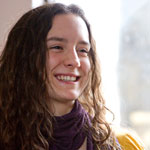
This is a fabulous article and much needed. The details and facts are right on target. Thank you Marissa and the Benjamins for sharing this very touching story of how it all began and is continuing to grow in all of our hearts.